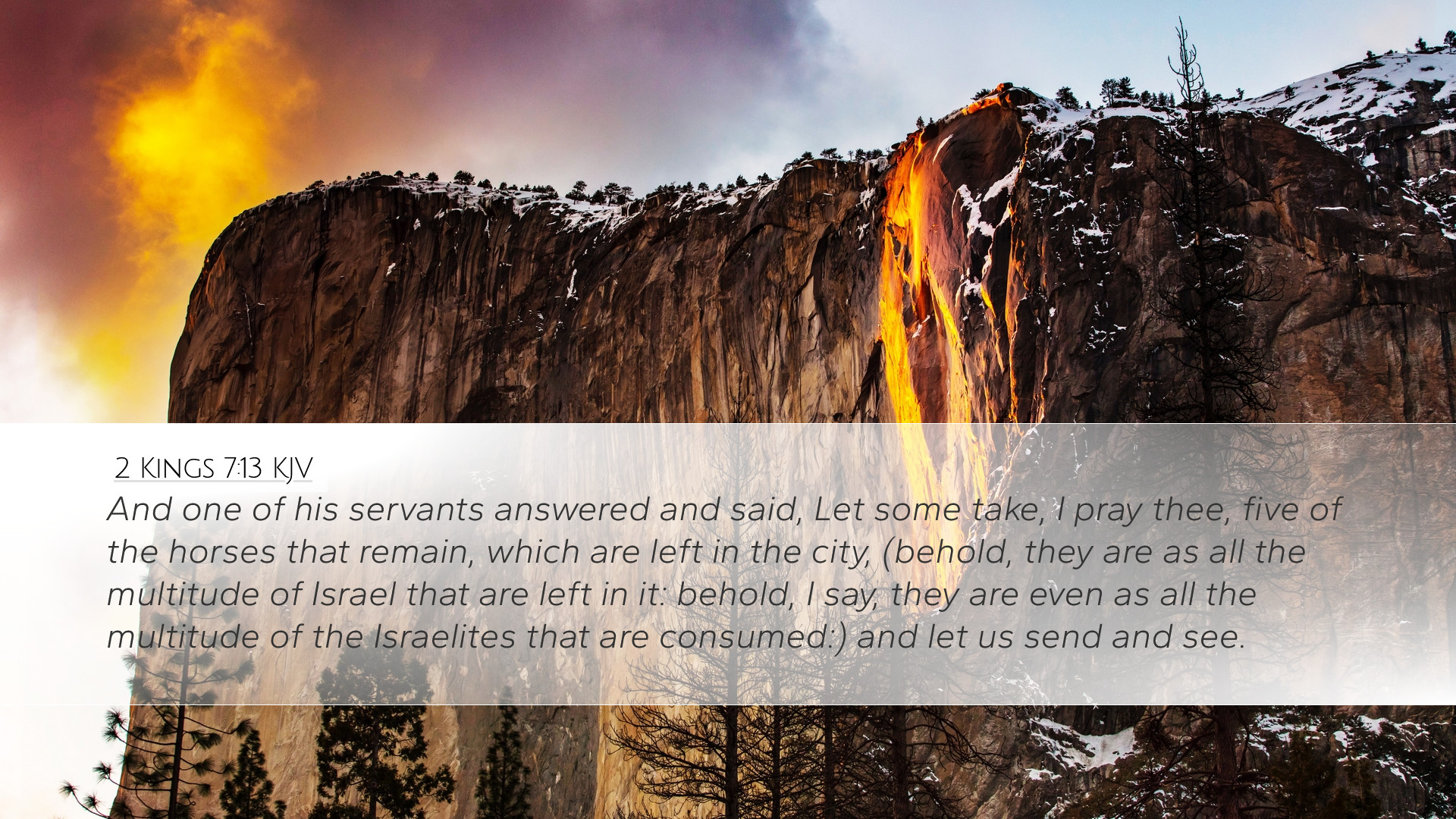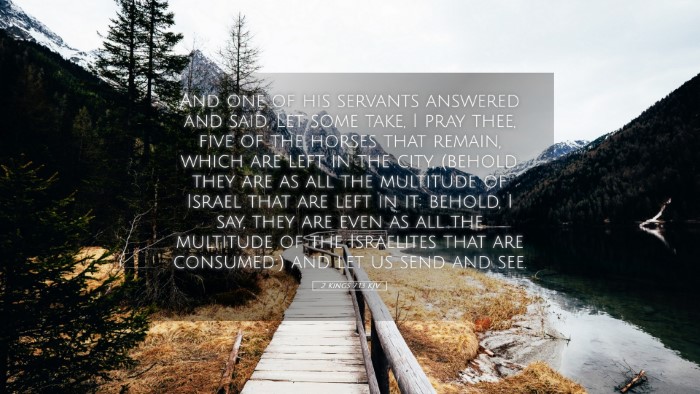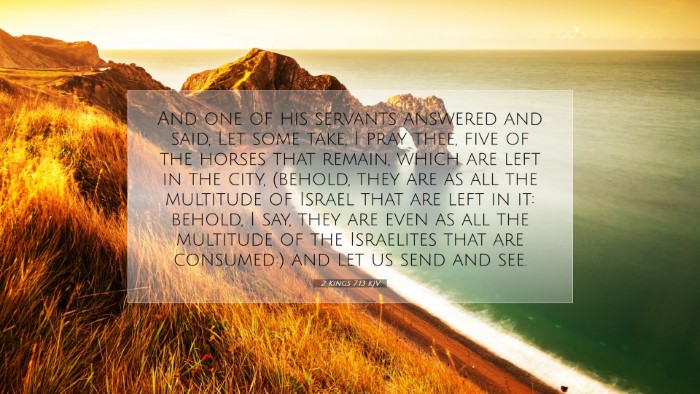Old Testament
Genesis Exodus Leviticus Numbers Deuteronomy Joshua Judges Ruth 1 Samuel 2 Samuel 1 Kings 2 Kings 1 Chronicles 2 Chronicles Ezra Nehemiah Esther Job Psalms Proverbs Ecclesiastes Song of Solomon Isaiah Jeremiah Lamentations Ezekiel Daniel Hosea Joel Amos Obadiah Jonah Micah Nahum Habakkuk Zephaniah Haggai Zechariah Malachi2 Kings 7:13
2 Kings 7:13 KJV
And one of his servants answered and said, Let some take, I pray thee, five of the horses that remain, which are left in the city, (behold, they are as all the multitude of Israel that are left in it: behold, I say, they are even as all the multitude of the Israelites that are consumed:) and let us send and see.
2 Kings 7:13 Bible Commentary
Commentary on 2 Kings 7:13
Verse: "And one of his servants answered and said, Let some take, I pray thee, five of the horses that remain, which are left in the city; (Behold, they are as all the multitude of Israel that are left in it: behold, I say they are even as all the multitude of the Israelites that are consumed:) and let us send and see."
Introduction
The context of 2 Kings 7 reveals a time of great distress for Israel, particularly for the city of Samaria, which was under siege by the invading Arameans. The conditions had led to severe famine, desperation, and hopelessness. This verse distills the moment when a servant proposes a practical solution to assess the situation outside the besieged city. Understanding the motivations and the surrounding circumstances provides deep insights into the nature of faith, desperation, and God's providence in times of crisis.
Contextual Overview
This chapter of 2 Kings opens with a prophetic proclamation from Elisha that relief from the famine is imminent. The narrative juxtaposes the divine promise with the human sense of reason and desperation manifested through the servant’s suggestion.
The Siege and Famine
The siege by the Arameans created a dire situation for the inhabitants of Samaria. With the city's gates closed and supplies dwindling, conditions were ripe for desperation. The servant's suggestion to send out scouts to determine whether the enemy persists or has fled underscores the tension between fear and hope.
The Role of the Servant
Matthew Henry points out that this servant, though unnamed, demonstrates both fear and initiative, reflecting the general mood of uncertainty and the desperate need for action. His suggestion reveals a flicker of hope, predicated on the idea that not all was lost—as there were still some horses in the city that were worth risking.
Insights and Reflections
Divine Sovereignty Amidst Despair
Albert Barnes emphasizes the hope inherent in this passage. Even when faced with overwhelming obstacles, the proposal to use five horses illustrates the notion that God can work through seemingly insignificant means. This aligns with the biblical principle that God's power is often made manifest through weakness (cf. 2 Corinthians 12:9).
Probability of Deliverance
The servant’s suggestion to send scouts raises philosophical questions about faith and human reasoning. Adam Clarke reflects on the significance of the number five; it represents grace, but in this context, it symbolizes the little remaining hope. If God is with them, even a handful can secure their deliverance.
Theological Implications
Hope in Desolation
2 Kings 7:13 serves as a reminder that even in desolation, hope can emerge. The servant's faith, albeit cautious, signals that not everything was lost. It teaches us that hope should not be discarded even in the bleakest of circumstances—leading to the practical response of probing the unknown rather than succumbing to despair.
Faith and Action
This verse illustrates the interaction between faith and action. The servant recognizes that while remaining steadfast in faith is critical, it should also inspire practical steps towards understanding the situation. In the face of crisis, believers are called not only to trust in divine providence but to engage actively with their context.
Practical Applications for Ministry
Courageous Steps in Ministry
Pastors and church leaders can glean from this verse the importance of courageous steps in times of uncertainty. Just as the servant took the initiative to seek clarity, leaders must assess their context and take the necessary steps to understand and respond to their congregations' needs amidst turmoil.
Encouragement in Trials
In pastoral counseling, the lesson of perseverance and the importance of seeking God's direction, often through prayer and action, is paramount. This narrative provides a framework for encouraging individuals facing personal sieges and offers reassurance that God is able to turn desperate situations into testimonies of faith and deliverance.
Conclusion
2 Kings 7:13 encapsulates the interplay between despair and hope, human reasoning and divine intervention. The servant's practical suggestion provides insight into the context while inviting readers to reflect on their own circumstances. As Christians, understanding that God often works through the seemingly insignificant elements of life encourages us to hold on to faith, take actionable steps, and trust in His ultimate deliverance.


